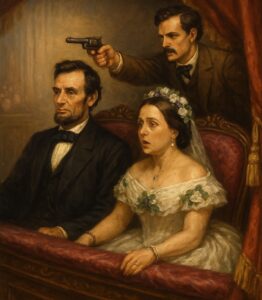Abraham Lincoln, the 16th President of the United States, was no stranger to adversity. He led the country through its darkest days—the Civil War—keeping the Union intact and paving the way for the abolition of slavery. But on the night of April 14, 1865, just days after the war had effectively ended, tragedy struck. Lincoln attended a performance of Our American Cousin at Ford’s Theatre in Washington, D.C., unaware that this evening would be his last.
John Wilkes Booth, a well-known actor and Confederate sympathizer, saw Lincoln as a tyrant who had destroyed the South. Fueled by anger and desperation, he planned an assassination that he believed would revive the Confederate cause. As the play reached a moment of laughter, Booth crept into the presidential box and fired a single shot into the back of Lincoln’s head. Chaos erupted in the theater as Booth leaped onto the stage, shouting “Sic semper tyrannis!”—Latin for “Thus always to tyrants”—before escaping into the night.
Doctors rushed to Lincoln’s side, but the wound was fatal. He was carried across the street to the Petersen House, where he lay unconscious for hours. As dawn approached on April 15, Lincoln took his final breath. Secretary of War Edwin Stanton solemnly declared, “Now he belongs to the ages.” The nation plunged into mourning, grieving the loss of a leader who had fought tirelessly for unity and justice.
Booth’s desperate flight from justice ended 12 days later when Union soldiers found him hiding in a Virginia barn. He was shot and killed after refusing to surrender. His plot to save the Confederacy had instead cemented Lincoln’s place as a martyr for American democracy.
Lincoln’s assassination was more than just the tragic end of a president—it was a moment that altered the course of history. His death left the country in shock, shaping the future of Reconstruction and the fight for civil rights. More than a century later, Lincoln’s legacy endures, a testament to the power of leadership, resilience, and the pursuit of freedom.

